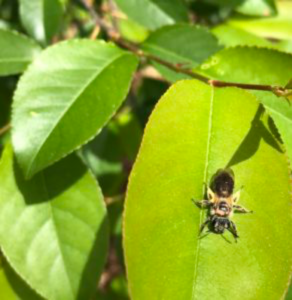Protect Ground Nesting Bees
go.ncsu.edu/readext?674071
en Español / em Português
El inglés es el idioma de control de esta página. En la medida en que haya algún conflicto entre la traducción al inglés y la traducción, el inglés prevalece.
Al hacer clic en el enlace de traducción se activa un servicio de traducción gratuito para convertir la página al español. Al igual que con cualquier traducción por Internet, la conversión no es sensible al contexto y puede que no traduzca el texto en su significado original. NC State Extension no garantiza la exactitud del texto traducido. Por favor, tenga en cuenta que algunas aplicaciones y/o servicios pueden no funcionar como se espera cuando se traducen.
Português
Inglês é o idioma de controle desta página. Na medida que haja algum conflito entre o texto original em Inglês e a tradução, o Inglês prevalece.
Ao clicar no link de tradução, um serviço gratuito de tradução será ativado para converter a página para o Português. Como em qualquer tradução pela internet, a conversão não é sensivel ao contexto e pode não ocorrer a tradução para o significado orginal. O serviço de Extensão da Carolina do Norte (NC State Extension) não garante a exatidão do texto traduzido. Por favor, observe que algumas funções ou serviços podem não funcionar como esperado após a tradução.
English
English is the controlling language of this page. To the extent there is any conflict between the English text and the translation, English controls.
Clicking on the translation link activates a free translation service to convert the page to Spanish. As with any Internet translation, the conversion is not context-sensitive and may not translate the text to its original meaning. NC State Extension does not guarantee the accuracy of the translated text. Please note that some applications and/or services may not function as expected when translated.
Collapse ▲Ground bees are active throughout central NC. Ground bees prefer areas with bare ground or thin grass so they have room to dig. The bees create small loose mounds of dirt an inch or two in diameter and up to an inch tall with a hole in the middle as wide as a pencil. Agents and landscapers may get calls from people who believe they have fire ants or cicada killer wasps or yellow jackets in their yard. If this was the case they would have more reason to try and remove them. However, this time of year the most likely culprits are several species of native bees. They are not a danger and are only out for a couple of weeks then disappear until next year. They even aerate your yard! Urban bees have a tough time as is and protecting their nests is more beneficial than planting flowers. So please leave them alone. If you must be rid of them you can water your yard which makes it hard for them to dig. Then they will go somewhere else. Yards with dense stands of grass also will not have ground bees.
WRITTEN BY
Dr. Steven Frank, Professor and Extension Specialist
Entomology & Plant Pathology
NC State Extension, NC State University




